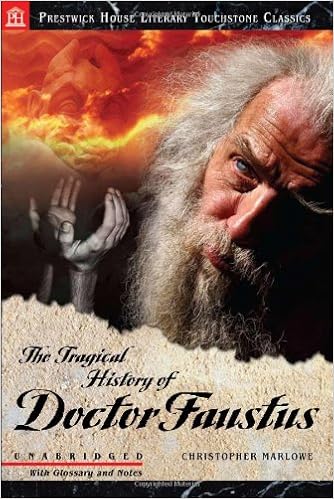
Introducing a classic of literature that needs no real introduction seems somewhat pointless, except when it is newly adapted and published in a modern form in order to inform secondary school students and actors new to acting. This is such a book. An adaption by Geraldine McCaughrean of the Germanic myth of Faust.
Marlowe’s version of this myth has Doctor Faustus – A student of excellence: becoming tired of such humble enterprises as philosophy, theology and science. He is looking for something worth his time. He decides on the occult and black magic. After consulting two of his friends (Valdes and Cornelius) who are magicians, he decides to summon a devil. He does so when he is alone by drawing a chalk pentagram and seeking the service of a Devil of Hell.
The devil Mephistopheles answers his call and swears to serve Faustus no matter the demand. Faustus asks for twenty four years of his every wish to be granted. This pact is made by signing a deed with his own blood: that after those twenty four years his soul shall be Satan’s and Hell’s. While trying to sign this contract with his blood (as the devil says it must be) it begins to congeal, and forces him to cut himself, and then Mephistopheles has to assist him to finish the contract. This very act makes it seem like Faustus’ own body (or maybe even his soul) is resisting the choice because its consequences are not worth it.
The story then skips to the future. Faustus is now famous for his powers. He entertains kings and noblemen, earning the respect of all but a few people who distrust him as a charlatan. He deals with these people in a comedic fashion, giving them antlers and the like. But he also punishes them with the torment of Hell which makes us question what he has become. All the while he fails to notice these twenty four years are almost up.
During the entire story Faustus is being advised by his good angel and evil demon who he cannot actually hear, but narrates what the consequences of his actions will be. The angel screaming “Think of your soul! Don’t turn your back on heaven.”, while the Demon speaks over it with: “Damn it all to Hell! Do what you desire!”. This demonstrates the choices he is making, and the duality of man and his desires mixed with what he should do (morality).
He is alone at his home when Mephistopheles informs him he only has an hour left. He dramatically speaks about how blind he has been, how he has rejected God and doesn’t even deserve to ask for forgiveness. All the while begging for the contract to be voided. With a clock ticking to increase the drama and his heart beating so loud the audience can hear his panic: this scene never fails to throw up anxiety, and make you worry about Faustus as if you yourself are him regretting his life choices. This puts the audience in the shoes of the good angel and evil demon: judging his choices and showing our own bias.
This particular version is the B text: which can be shown clearly by the ending – Faustus is dragged off by the devil Mephistopheles with two hooks which are plunged into him. He is thus dragged to hell, or so it seems. When three fellow students of Faustus’ university visit his house they find gloom, a mess and a body torn limb from limb. While the A text is far more ambiguous: Faustus is merely dragged away (presumably to hell) and nothing else is heard from him. His fellow students just find an empty, messy house with evidence of a struggle.
This adaption is unique in the way that it doesn’t just tell the story, but has a twenty page section on writing and acting in order to refine people’s abilities to absorb the play, and other abilities related to writing and play acting. Showing that the play is about choices and consequences, and the many ways that the play could have been utterly different. A study of the morality of the play and how Faustus can be seen in so many ways: weak, arrogant, knowing what he is doing, a victim of human flaw. It even imagines that Faustus is on trail and for you to write a defence/attack on him in order to free him from the contract, or for him to be punished with Hell. While all of this is useful for honing one’s abilities, it also allows one to take even more from the play than you get from one simple reading. rlowe’s genius, and why this play is still pThis all works together to show Maerformed to this day.
No comments:
Post a Comment